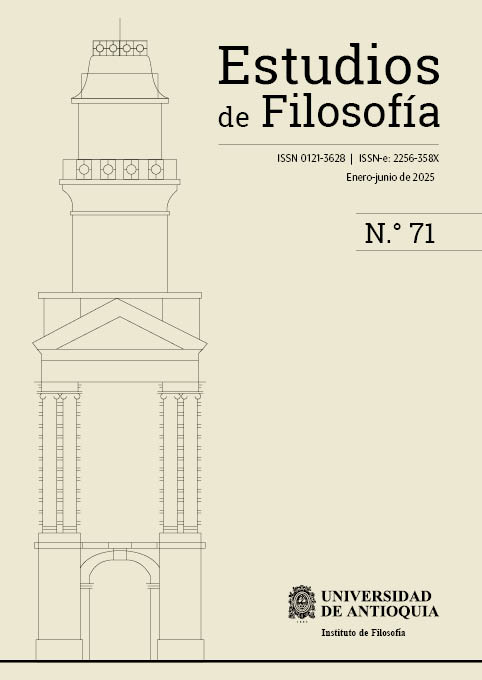Language of shock and present experience: Benjamin as a reader of Baudelaire
DOI:
https://doi.org/10.17533/udea.ef.355722Keywords:
Real , Shock, Baudelaire, Walter Benjamin, PsychoanalysisAbstract
This article discusses Benjamin's interpretation of Baudelaire's poetry as a key to reading modernity. Understanding the ambiguities between novelty and archaism, typical of the time, is only possible thanks to the poet’s gesture of privileging radical contingency. On the one hand, the violence of unwanted encounters amid the crowd does not allow for reflection; on the other, its productive dimension makes contingency speakable. The poet’s verses will make possible the encounter of the now of experience with the available past in terms of expectation: explanatory images are produced from the singularity of language. Finally, the Lacanian real is produced thanks to the understanding of the psyche as structure.
Downloads
References
Baudelaire, C. (1961). Œuvres complètes. Gallimard/La Pléiade.
Baudelaire, C. (1989). Las flores del mal. Porrúa.
Baudelaire, C. (1999). Salones y otros escritos sobre arte. Visor.
Benjamin, W. (1971a). Les affinités électives de Goethe. Les Lettres Nouvelles – Éditions Denoël.
Benjamin, W. (1971b). Fragment théologico-politique. Les Lettres Nouvelles – Éditions Denoël.
Benjamin, W. (1984). Origem do drama barroco alemão. Brasiliense.
Benjamin, W. (1985). Magia e técnica, arte e política – Obras escolhidas I. Brasiliense.
Benjamin, W. (1987). Rua de mão única – Obras escolhidas II. Brasiliense.
Benjamin, W. (1989). N [Re the theory of knowledge, theory of progress]. En G. Smith (Ed.), Benjamin: Philosophy, aesthetics, history (pp. 65-85). University of Chicago Press.
Benjamin, W. (1993). Séction D: L’ennui, l’éternel retour. En Paris, capitale du XIX siècle (pp. 56-73). Les Éditions du Cerf.
Benjamin, W. (1994). Charles Baudelaire: Um lírico no auge do capitalismo - Obras escolhidas III. Brasiliense.
Bergson, H. (2012). Matière et mémoire. Essai sur la relation du corps à l’esprit. Flammarion.
Foucault, M. (1994). ¿Qué es la Ilustración? En Actual, pp.1-118, 28.
Freud, S. (1975). Más allá del principio de placer. En Obras completas (Vol. XVIII, pp. 3-50).
Freud, S. (2010). L’interprétation du rêve. Seuil.
Konder, L. (1999). Walter Benjamin: O marxismo da melancolia. Civilização Brasileira.
Konder, L. (2002). A questão da ideologia. Companhia das Letras.
Lacan, J. (1977). C’est à la lecture de Freud. Preface à Robert Georgin, Lacan (pp. 5-16). Lausana, L´Âge d´Homme-Cistre.
Lacan, J. (1966). Écrits. Seuil.
Lacan, J. (1973). Le séminaire livre XI. Les quatre concepts fondamentaux de la psychanalyse. Seuil.
Lacan, J. (1975). Le séminaire livre I. Les écrits techniques de Freud. Seuil.
Lacan, J. (1986). Le séminaire livre VII. L’éthique de la psychanalyse. Seuil.
Lacan, J. (2011). Le séminaire livre XIX. Ou pire. Seuil.
Lacan, J. (2017). Conférence à Genève sur le symptôme. En La cause du désir (Vol. 1, No. 95, pp. 7-24). L'École de la Cause freudienne. https://doi.org/10.3917/lcdd.095.0007
Löwy, M. (1990). Romantismo e messianismo. Perspectiva.
Lukács, G. (1960). Histoire et conscience de classe. Minuit.
Marx, K. (1962). Manuscritos económico-filosóficos. Fondo de Cultura Económica.
Marx, K. (1983). O capital – Livro I. Abril Cultural.
Muricy, K. (1987). Benjamin: Política e paixão. En Os sentidos da paixão (pp. 90-105). Companhia das Letras.
Muricy, K. (1998). Alegorias da dialética. Relume Dumara.
Poe, E. A. (1846). The philosophy of composition. Graham's Magazine, 28(4), 163-167. https://www.eapoe.org/works/essays/philcomp.htm
Proust, M. (1987-1989). À la recherche du temps perdu (Vols. I-IV). Gallimard/La Pléiade.
Rouanet, S. P. (1987). As razões do iluminismo. Companhia das Letras.
Published
How to Cite
Issue
Section
Categories
License
Copyright (c) 2024 Gustavo Chataignier; Lorena Souyris

This work is licensed under a Creative Commons Attribution-NonCommercial-ShareAlike 4.0 International License.
Authors who publish with this journal agree to the following terms:
1. The Author retains copyright in the Work, where the term "Work" shall include all digital objects that may result in subsequent electronic publication or distribution.
2. Upon acceptance of the Work, the author shall grant to the Publisher the right of first publication of the Work.
3. The Author shall grant to the Publisher a nonexclusive perpetual right and license to publish, archive, and make accessible the Work in whole or in part in all forms of media now or hereafter known under a Creative Commons Attribution-NoCommercia-ShareAlike (CC BY-NC-SA 4.0), or its equivalent, which, for the avoidance of doubt, allows others to copy, distribute, and transmit the Work under the following conditions: (a) Attribution: Other users must attribute the Work in the manner specified by the author as indicated on the journal Web site;(b) Noncommercial: Other users (including Publisher) may not use this Work for commercial purposes;
4. The Author is able to enter into separate, additional contractual arrangements for the nonexclusive distribution of the journal's published version of the Work (e.g., post it to an institutional repository or publish it in a book), as long as there is provided in the document an acknowledgement of its initial publication in this journal;
5. Authors are permitted, and Estudios de Filosofía promotes, to post online the preprint manuscript of the Work in institutional repositories or on their Websites prior to and during the submission process, as it can lead to productive exchanges, as well as earlier and greater citation of published work (see The Effect of Open Access). Any such posting made before acceptance and publication of the Work is expected be updated upon publication to include a reference to the Estudios de Filosofía's assigned URL to the Article and its final published version in Estudios de Filosofía.















